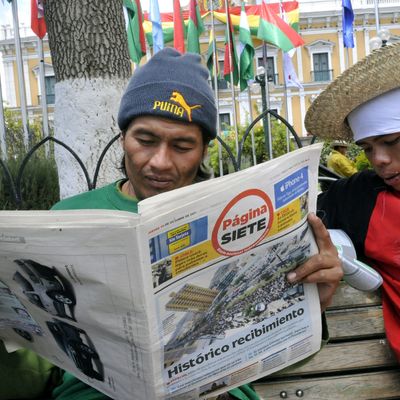
In mid-October Página Siete, Bolivia’s third-largest news site, had a problem. Its Facebook traffic — like many publishers, one of the largest sources of traffic for the site — was falling off a cliff. Página Siete thought perhaps it had become the target of pro-government hackers, angered by what the hackers saw as Página Siete’s anti-government stance.
But the culprit behind Página Siete’s plummeting traffic wasn’t hackers. It was Facebook itself. The company had decided to remove all of Página Siete’s content from the main News Feed page, and instead place it in the (much less seen) “Explore” tab.
Facebook similarly experimented with with moving non-promoted posts from publishers in Slovakia, Sri Lanka, Serbia, Guatemala, and Cambodia completely out of its News Feed altogether.
But what happened to those six countries may soon be happening across the world. Facebook is in the middle of what appears to be a sea change in its News Feed. After almost a decade of aggressively courting news publishers, whether by setting up internal teams meant to work directly with publishers, subsidizing efforts like Facebook Live video, or creating revenue-share deals through hosting publisher’s content Facebook’s Instant Articles, for many years it appeared that Facebook saw its fortunes tied to the success or failure of the international media ecosystem.
But news on Thursday has made it clear clear that the future of News Feed will be posts from friends and family — not publishers. While Facebook says the changes it’s introducing won’t be the same as those seen in Bolivia or other countries in October, it has made it clear that changes are afoot. And it’s hard not to see this partly as the result of the increasing connection in many people’s minds between Facebook links and fake news.
“With this update, we will also prioritize posts that spark conversations and meaningful interactions between people,” said Adam Mosseri, head of the News Feed product. “To do this, we will predict which posts you might want to interact with your friends about, and show these posts higher in feed.”
Which, up to a point, makes sense. There is little financial incentive for your birther uncle in Oklahoma or that one 9/11-truther friend from high school to share fake news — even when they are posting links to another site, they gain no money from doing so.
But Facebook often seems to operate under the assumption that people only share fake information for financial gain. The truth is much more complicated. People often share fake information because they believe it to be true.





























